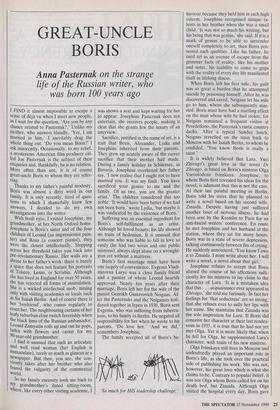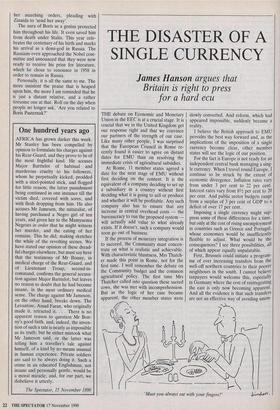GREAT-UNCLE BORIS
Anna Pasternak on the strange
life of the Russian writer, who was born 100 years ago
I FIND it almost impossible to escape a sense of déjà vu when I meet new people, as I wait for the question, 'Are you by any chance related to Pasternak?,' Unlike my mother, who answers blandly, 'Yes, I am married to him,' I inevitably drag the whole thing out. 'Do you mean Boris?' I ask innocently. Occasionally, to my relief, a mysterious American film producer cal- led Joe Pasternak is the subject of their enquiries and, thankfully, he is no relation. More often than not, it is of course great-uncle Boris to whom they are refer- ring.
Thanks to my father's painful modesty, Boris was almost a dirty word in our family. It is only recently, tired of ques- tions to which I shamefully knew few answers, I decided to do my own Investigations into the writer. With fresh eyes, I visited Josephine, my grandmother, at her North Oxford home. Josephine is Boris's sister and of the four children of Leonid (an impressionist pain- ter) and Rosa (a concert pianist), they were the closest intellectually. Stepping across her threshold takes you back into pre-revolutionary Russia. Her walls are a shrine to her father's work: there is barely a space that does not feature his portraits of Tolstoy, Lenin, or Scriabin. Although she has lived in England for over 50 years, she has rejected all forms of assimilation. She is a wicked intellectual snob, mixing only with visiting academics or locals such as Sir Isaiah Berlin. And of course there is her 'boyfriend', who comes regularly to court her. The neighbouring curtains of her leafy suburban close twitch feverishly when the black limo of the Russian ambassador, Leonid Zamyatin rolls up and out he pops, laden with flowers and caviar for my 90-year-old grandmother. I find it unusual that such an articulate and well read woman (her English is immaculate), rarely so much as glances at a newspaper. But then, you see, she con- viently takes after her brother who also feared the vulgarity of the commercial world.
So my family curiosity took me back to my grandmother's dated sitting-room, where, like every other visiting academic, I was shown a seat and kept waiting for her to appear. Josephine Pasternak does not entertain, she receives people, making it clear that she grants few the luxury of an interview.
Sacrifice, justified in the name of art, is a trait that Boris, Alexander, Lydia and Josephine inherited from their parents. They grew up acutely aware of the career sacrifice that their mother had made. During a family holiday in Schliersee, in Bavaria, Josephine overheard her father say, now realise that I ought not to have married you. It was my fault. You have sacrificed your genius to me and the family. Of us two, you are the greater artist.' The children considered this too noble: 'It would have been better if we had not been born,' wrote Lydia, tut maybe it was vindicated by the existence of Boris.'
Suffering was an essential ingredient for Boris's self-fulfilment as an artist. Although he loved beauty, his life showed no traits of hedonism. It is unusual that someone who was liable to fall in love so easily (he had two wives and one public mistress), always slept alone on a wrought- iron cot without a mattress.
Boris's first marriage must have been one largely of convenience. Evgenia Vladi- mirovna Lurye was a close family friend and a painter of whom Leonid heartily approved. Nearly ten years after their marriage, Boris left her for the wife of the pianist Genrikh Gustavovich Neigaus. Af- ter the Pasternaks and the Neigauses holi- dayed together in Irpen in 1930, Boris sent Evgenia, who was suffering from tubercu- losis, to his family in Berlin. He negated all responsibility for her when he wrote to his parents, 'Do love her.' And we did,' remembers Josephine.
The family accepted all of Boris's be- `So much for HIS leadership challenge.' haviour because they held him in such high esteem. Josephine recognised unique ta- lents in her brother when she was a small child. 'It was not so much his writing, but his being that was genius,' she said. If it is a mark of genius to be able to surrender oneself completely to art, then Boris pos- sessed such qualities. Like his father, he used art as an avenue of escape from the grimmer facts of reality; like his mother and sister, his inability to come to grips with the reality of every day life manifested itself in lifelong illness.
When Boris left his first wife, his guilt was so great a burden that he attempted suicide by poisoning himself. After he was discovered and saved, Neigaus let his wife go to him, whom she subsequently mar- ried. Boris must have had a startling effect on the man whose wife he had stolen, for Neigaus remained a frequent visitor at Peredelkino, the Pasternak's rustic country dacha. After a typical Sunday lunch, Neigaus travelled on the train back to Moscow with Sir Isaiah Berlin, to whom he confided, 'You know Boris is really a saint.'
It is widely believed that Lara, Yuri Zhivago's great love in the novel Dr Zhivago, is based on Boris's mistress Olga Vsevolodvna Ivinskaya. Josephine, to whom Boris first revealed his ideas for the novel, is adamant that this is not the case.
At their last painful meeting in Berlin, Boris told his sister that he planned to write a novel based on his second wife, Zinaida. Despite having just suffered another bout of nervous illness, he had been sent by the Kremlin to Paris for an anti-fascist writers' conference. En route he met Josephine and her husband at the station, where they sat for many hours.
Boris was in a state of severe depression, talking continuously between fits of crying. He suddenly announced, 'You know I owe it to Zinaida. I must write about her. I will write a novel, a novel about that girl.' Josephine refuses to accept that Boris altered the course of his affections suffi- ciently for his mistress to lay claim to the character of Lara. 'It is a mistaken idea that this . . acquaintance ever appeared in Zhivago,' she told me furiously. In fact her feelings for 'that seductress' are so strong, that she refuses ever to sully her lips with her name. She maintains that Zinaida was the sole inspiration for Lara. If Boris did conceive her character at their last rendez- vous in 1935, it is true that he had not yet met Olga. Yet it is more likely that when he fell for Olga, he supplemented Lara's character, with traits of his new mistress.
Olga Ivinskaya still lives in Moscow and undoubtedly played an important role in Boris's life, as she took over the practical side of publishing his work. She was not, however, his great love which is what she claims to be. Contrary to popular belief, it was not Olga whom Boris called for on his death bed, but Zinaida. Although Olga visited the hospital every day, Boris gave her marching orders, pleading with Zinaida to 'send her away'.
The aura of Boris as a genius protected him throughout his life. It even saved him from death under Stalin. This year cele- brates the centenary of his birth and marks his arrival as a demi-god in Russia. The Russians even approached the Nobel com- mittee and announced that they were now ready to receive his prize for literature, which he chose to renounce in 1958 in order to remain in Russia.
Personally, it is all the same to me. The more insistent the praise that is heaped upon him, the more I am reminded that he is just a distant relative, and a rather tiresome one at that. Roll on the day when people no longer ask, 'Are you related to Boris Pasternak?'
























































 Previous page
Previous page